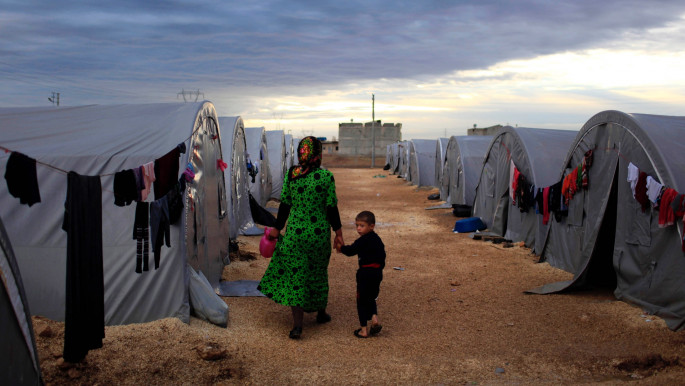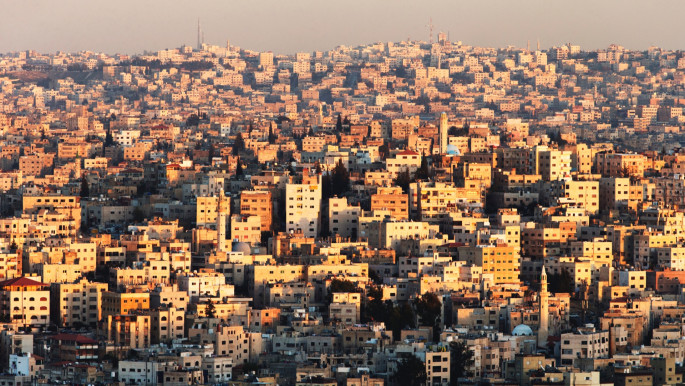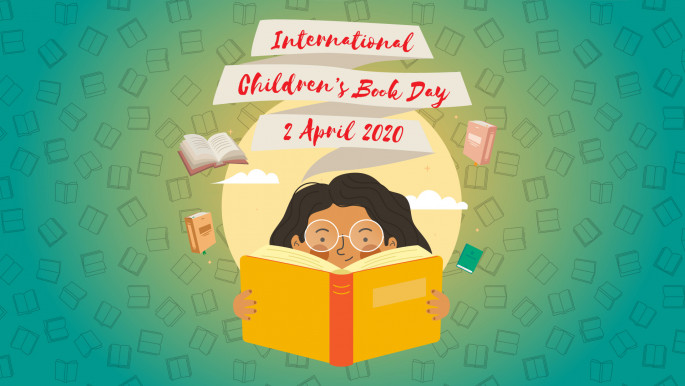Learning under lockdown: How Jordan's students are adapting to the coronavirus pandemic
On 15 March, Jordan closed all education centres in the country, leaving over four million pupils no option but to study from home.
As the school term continues as normal, students across the country are adapting to a new learning methodology.
To keep students engaged, the Jordanian government, together with technological start-up companies, have developed the platform 'Darsak'.
Online learning
The platform hosts three different websites, namely Idrak, Jo Academy and Abwab. Everyday three to four new lessons are uploaded to the platform between 6am and 4pm, but they are accessible at any time.
"I have adapted quickly because I belong to a new generation familiar with using technology," Maha Zghoul, a tenth-grade student at a public school in Amman, told The New Arab.
Maha said she values the platform as "user friendly", explaining that she can repeat any lesson as many times as she needs, as well as skip the subjects that she finds difficult to understand.
 |
As the school term continues as normal, students across the country are adapting to a new learning methodology |  |
However, the platform is not interactive. The pre-existing platform 'NoorSpace', for example, allowed teachers to upload students' grades, allowing them to interact with each other.
But teachers are not waiting for the government to step in. Many of them have already set up WhatsApp and Facebook groups for each classroom to ensure constant communication with students and parents.
"When there are technical problems on the application, the teacher advises us to keep studying through WhatsApp," said Nasser Al-Shamri, father of Faisal, a 3rd grade student in a public school in Zarqa.
But not all subjects are available online. Currently uploaded lessons focus on English, Arabic, mathematics, chemistry and physics while social sciences, humanities and religion are not being covered.
The continuation of studies will not only result in many children failing school, but will also create a knowledge gap whose consequences will be visible in the upcoming term.
 |
|
| Read more: For Middle East refugees, social distancing is a privilege few can afford |
Teachers strike
The Covid-19 crisis is resulting in an increased burden for students, their families and teachers, adding to the month students already lost at the beginning of the school year.
A month-long teachers' strike in September kept students at home without being able to continue their studies until the teachers' union reached an agreement with the government to raise their salaries by 35 to 60 percent.
"The strike had a big impact because it delayed the courses, so I had to hire a private tutor to help me with some subjects," explained Maha.
She says that the impact at the moment is less severe because they use online platforms to keep studying, but due to the current lockdown she cannot seek support in subjects which she finds difficult, such as mathematics.
"Of course, the work has increased since its nature is different than how we used to do it," explained Eman Gharbieh, a first-grade teacher at a public school in Al Muhajireen, Amman.
Gharbieh says that with this new model a lot of social and interactive activities cannot be done. "Most of the teachers prefer to go to school because they love to work in groups and interact with the students," the first-grade teacher told The New Arab.
She receives the answers to exams and homework through a WhatsApp group that she created for her classroom, together with many messages from her pupils wishing to go back to school and telling her how much they miss her.
Apart from being a teacher, Gharbieh she is also a mother of two, which adds a double burden for her.
 |
Over 9 million Jordanians have access to the internet and almost the same number are mobile subscribers, but more than 10 percent cannot afford the high cost of internet access, mainly in rural areas |  |
"It is a big responsibility since it needs a lot of patience and time management and understanding the children's willingness to study with their teachers," she explains.
"The crisis has not impacted me personally, but it has impacted the semester, which is becoming so long," complained Maha, acknowledging that her commitment to studying has waned as she does not face the pressure of homework and exams.
But overall, e-learning solutions are praised by students, teachers and education experts.
"The government is learning from previous periods and they are stepping up to do public-private partnerships," Saddam Sayyaleh, co-founder and director of I learn and director of Majlisna, a grassroots initiative for vulnerable communities, told The New Arab.
"As someone who runs a social enterprise, it is very encouraging that the public sector looks into start-ups and especially those run by youth as a solution for transitioning from the old way to the new one," said Sayyaleh, who is also board member of Generation unlimited, a platform to help globally bridge youth skills with private-public sector.
Vulnerable communities
Vulnerable communities are being highly impacted by the closure of schools and the transition to online learning.
Over 9 million Jordanians have access to the internet and almost the same number are mobile subscribers, but more than 10 percent of Jordanians cannot afford the high cost of internet access, mainly in rural areas.
Besides, not everybody has good smartphones or enough space to download the educational apps, and the purchase of data is becoming a huge economic burden for many families.
"A typical family in one of the areas we work has an average of four children but they only have access to one or two smartphones at home and the television is usually occupied by the father to fill their time," explained Sayyaleh.
 |
|
| Read more: Gentrification and grassroots resistance in Amman's historic Jabal al-Weibdeh district |
These families are faced with the difficult decision of prioritising the education of some of their children above others.
"This is a problematic feeling because it creates a vulnerability inside the family since parents are unable to provide all of their children with an equal opportunity to learn at the same time," lamented Sayyaleh.
Income is not the only barrier. Also, age and education play their part since most internet users are under 35 years old and have a high level of education. Many parents in rural areas are illiterate and unable to support their children and navigate this technological transition.
"We cannot assume simply that all people are accessing online learning and they are understanding it," he added.
As a solution to reach the most disconnected communities, the Jordanian government set up two television channels to broadcast lessons from first to eleventh grades.
However, this solution is not practicable for families who only have one television which is the only form of entertainment for all family members.
 |
The stress many families are facing as a consequence of the economic impact of the crisis is resulting in an increase in domestic violence, particularly towards children |  |
The stress many families are facing as a consequence of the economic impact of the crisis is resulting in an increase in domestic violence, particularly towards children.
"Many parents cannot entertain the idea that their children are home 24 hours. They are not ready for this and they do not know what to do," explained the social entrepreneur.
This is caused by a lack of culture of dialogue with children, who usually are never asked about their feelings and are being impacted by a situation they do not understand.
"Last year we asked 100 mothers when was the last time that they sat down with their children and talked to them. None of them answered. Imagine how scary that is," said Sayyaleh.
The crisis might be an opportunity for the government to start talking openly about mental health and wellbeing, whether for adults or children.
"I think today it is very unfair to talk about children and excluding parents because it is a cycle inside the home. If parents are stressed, they reflect that on the most vulnerable in the family, and those are children", he added.
Grassroots and blended learning
 |
|
| Read more: Books by Muslim authors every child should be reading |
Organisations such as 'I learn' and 'Majlisna' have come up with solutions adapted to the needs of each family, thanks to a network of 1,500 volunteers.
These volunteers have established WhatsApp and Facebook groups in each area and hold activities such as live sessions and workshops to help parents reduce stress and do activities with their children, providing not only knowledge but also emotional support.
Their work is driven by what is called 'blended' learning methodology. This method consists in adapting to the needs of each community by providing knowledge in different formats.
"Let's say that there is a mother who does not have data and she is unable to watch the session even though she needs it. What we do is go offline, pick up the phone and call her to share the knowledge she needs," explained Sayyaleh.
Youth volunteers are also tutoring their neighbours and siblings and launching local initiatives supported both financially and strategically by the organisations.
"Youth are essential to the process of transition because they are the generation gap: they understand children and their parents and have the skills to help parents in the technological transition," explained Sayyaleh.
For him, the solution is clear: grassroots organisations and a blended learning methodology. "If the government do not operate a national plan for grassroots to help them bridge the knowledge gap, children will struggle," he said.
Meanwhile, children like Maha and Faisal look forward to next September, when they can go back to school and see their classmates and teachers again.
Victoria Silva is a freelance journalist based in Jordan, covering Middle East affairs for Spanish media.
Follow her on Twitter: @VickyShishaz





 Follow the Middle East's top stories in English at The New Arab on Google News
Follow the Middle East's top stories in English at The New Arab on Google News


